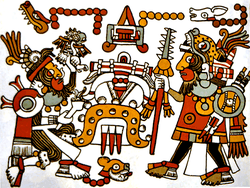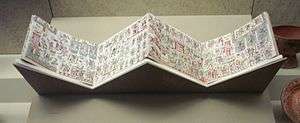Eight Deer Jaguar Claw
Eight Deer Jaguar Claw (Mixtec: Iya Nacuaa Teyusi Ñaña [1]), or 8 Deer for brevity, was a powerful Mixtec ruler in 11th century Oaxaca referred to in the 15th century deerskin manuscript Codex Zouche-Nuttall, and other Mixtec manuscripts. His surname is alternatively translated Tiger-Claw and Ocelot-Claw. John Pohl has dated his life as having lasted from 1063 until his death by sacrifice in 1115.[2] Consonant with standard Mesoamerican practice, the "Eight Deer" component of his name refers to his day of birth within the 260-day Mesoamerican cycle, which cycles through 13 numbers and 20 various signs (e.g., animals, plants, natural phenomena).
Eight Deer Jaguar Claw | |
|---|---|
 Eight Deer Jaguar Claw (right) Meeting with Four Jaguar, in a depiction from the Codexl604 Zouche-Nuttall. His name glyph (a deer head and eight red dots) is above his head. | |
| Born | 1063 Tilantongo, Mexico |
| Died | 1115 Tilantongo, Mexico |
| Other names | Eight Deer, Eight Deer Ocelot Claw |
| Occupation | Mixtec ruler |
Biography
Born on the Mixtec Calendar date from which he got his name, 8 Deer was the son of the high priest of Tilantongo 5 Crocodile “Sun of Rain”. His mother was Lady 9 Eagle “Cocoa-Flower”, queen of Tecamachalco. He also had two brothers, 12 Earthquake “Bloody Jaguar” and 9 Flower “Copalball with Arrow” who were both faithful war companions of 8 Deer.
He also had a half-sister 6 Lizard “Jade-Fan”. First the fiancee and lover of 8 Deer himself, she was finally married to 8 Deer's archenemy 11 Wind “Bloody Jaguar”, the king of the city "Xipe's Bundle", also known as Red and White Bundle. The lords of Xipe's Bundle had rights to the throne of Tilantongo and were therefore the most important rivals to 8 Deer's power.

Lord 8 Deer is remembered for his military expansion. The Codex Zouche-Nuttall counts 94 cities conquered during his reign. Almost always pictured wearing a jaguar helmet, he supported the powerful Toltec ruler of Cholula, Lord 4 Jaguar “Face of the Night” in his attempts at expansionism, and was thus awarded a turquoise nose ornament, a symbol of Toltec royal authority.[3]
The Codices also tell of his several marriages which seem to have been part of a political strategy to achieve dominance by marrying into different Mixtec royal lineages. He married 13 Serpent, daughter of his own stepsister and former fiancee of 6 Lizard.
In 1101 8 Deer finally conquered Xipe's Bundle, killed his wife's father and his stepsister's husband 11 Wind and tortured and killed his brothers-in-law, except the youngest one by the name of 4 Wind. In 1115 4 Wind led an alliance between different Mixtec kingdoms against 8 Deer who was taken prisoner and sacrificed by 4 Wind, his own nephew and brother-in-law.[3]
Legacy
8 Deer was the only Mixtec king ever to unite kingdoms of the three Mixtec areas: Tilantongo in the Mixteca Alta area with Teozacualco of the Mixteca Baja area and Tututepec of the coastal Mixteca area.
His reputation as a great ruler has given him a legendary status among the Mixtecs; some aspects of his life story as it is told in the pictographic codices seem to merge with myth. Furthermore, actual knowledge of his life is hindered by the lack of complete understanding of the Mixtec codices, and although the study of the codices has advanced much over the past 20 years, it is still difficult to achieve a definitive interpretation of their narrative. The narrative, as it is currently understood, is a tragic story of a man who achieves greatness but falls victim to his own hunger for power. The above biography of 8 Deer is based on the Codex's interpretation by Mixtec specialist John Pohl.[4]
Notes
- Jansen and Pérez Jiménez (2004)
- See Pohl (n.d.)
- Pohl (n.d.)
- See Pohl (2002); Byland and Pohl (1994)
References
- Byland, Bruce E.; Pohl, John M.D. (1994). In The Realm of Eight Deer: The Archaeology of the Mixtec Codices. Norman: University of Oklahoma Press. ISBN 978-0-8061-2612-8. OCLC 30892609.
- Jansen, Maarten (1998). "Monte Albán y Zaachila en los codices mixtecos". In Maarten E.R.G.N. Jansen; Peter C. Kröfges; Michel R. Oudijk (eds.). In The Shadow of Monte Albán: Politics and Historiography in Postclassic Oaxaca, Mexico (in Spanish). Leiden, Netherlands: Research School CNWS (Leiden University School of Asian, African and Amerindian Studies). ISBN 978-90-5789-006-2. OCLC 40511286.
- Jansen, Maarten (2003). Monument en verhaal in het land van de Regengod (PDF) (in Dutch). Amsterdam: Koninklijke Nederlandse Akademie van Wetenschappen (KNAW). ISBN 978-90-6984-382-7. OCLC 66724118. Archived from the original (PDF) on 2007-07-12.
- Jansen, Maarten; Jiménez, Gabina Aurora Pérez (2004). "Renaming the Mexican Codices". Ancient Mesoamerica. 15 (2): 267–271. doi:10.1017/S0956536104040179. hdl:1887/16354. ISSN 0956-5361.
- Pohl, John M.D. (n.d.). "Ancient Books: Mixtec Group Codices". John Pohl's Mesoamerica. Foundation for the Advancement of Mesoamerican Studies, Inc (FAMSI). Retrieved 2007-08-21.
- Pohl, John M.D. (2002). The Legend of Lord Eight Deer: An Epic of Ancient Mexico. Oxford; New York: Oxford University Press. ISBN 978-0-19-514019-4. OCLC 47054677.
- Spores, Ronald (1967). The Mixtec Kings and Their People. Norman: University of Oklahoma Press. ISBN 978-0-8061-1091-2.
- Troike, Nancy P. (1987). Codex Zouche-Nuttall: British Museum, London (Add. MS. 39671). Codices Selecti series. 84 (true-color facsimile screenfold reproduction ed.). Graz, Austria: Akademische Druck- u. Verlagsanstalt Graz/Austria. ISBN 978-3-201-01350-5. OCLC 165889191.